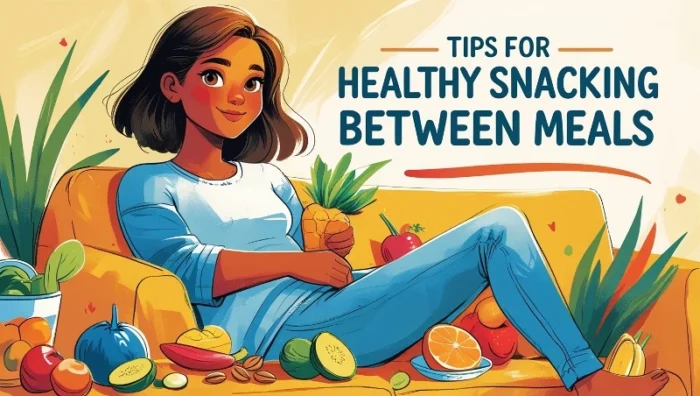Snacking is often seen as a guilty pleasure, something that can easily lead to overeating or unhealthy habits. However, when done right, snacking between meals can be a healthy way to manage hunger, boost energy, and provide essential nutrients. Choosing the right snacks and consuming them mindfully can play an important role in supporting your overall health.

In this article, we will explore ten practical tips for healthy snacking between meals, helping you make informed choices that benefit your body without compromising your goals.
Table of Contents
1. Choose Nutrient-Dense Snacks
The first step to healthy snacking is ensuring that your snacks are nutrient-dense, meaning they provide a high amount of vitamins, minerals, and other nutrients relative to their calorie content. Opting for nutrient-dense snacks will not only satisfy your hunger but also support your body’s needs, preventing you from feeling sluggish or nutrient-deficient.
Why It’s Important:
Nutrient-dense snacks are packed with vitamins, fiber, and healthy fats, which keep your body energized and help maintain a balanced diet. These snacks can also support various bodily functions, including metabolism, digestion, and muscle repair.
Examples of Nutrient-Dense Snacks:
Fresh fruits like apples, oranges, or berries
Raw vegetables like carrots, cucumbers, and celery with hummus
A handful of mixed nuts or seeds
Greek yogurt with a sprinkle of chia seeds or flaxseeds
Why It’s Beneficial:
Choosing nutrient-dense snacks ensures you’re getting more out of your food. These snacks tend to be more filling, reducing the likelihood of overeating and providing sustained energy without spikes and crashes in blood sugar levels.
2. Incorporate Protein into Your Snacks
Protein is an essential macronutrient that plays a key role in building and repairing tissues, supporting immune function, and keeping your energy levels steady. Including protein in your snacks helps to curb hunger, increase satiety, and prevent overeating during meals.
Why It’s Important:
Snacks that are rich in protein help regulate blood sugar levels and ensure that your muscles and tissues have the building blocks they need. Protein also promotes feelings of fullness, helping you resist cravings for unhealthy options later on.
Examples of Protein-Rich Snacks:
Boiled eggs or hard-boiled eggs
Greek yogurt or cottage cheese
A small serving of lean meat, such as turkey or chicken
Hummus with raw vegetables
A protein bar (look for ones with minimal sugar and artificial ingredients)
Why It’s Beneficial:
By incorporating protein into your snacks, you will be able to avoid blood sugar spikes and crashes. It will keep you feeling satisfied longer and prevent unnecessary snacking between meals.
3. Watch Your Portion Sizes
It’s easy to get carried away with snacking, especially when you have easy access to large bags of chips or a handful of nuts. However, portion control is essential to ensure that your snacks don’t end up contributing to overeating or unnecessary calorie intake.
Why It’s Important:
Portion control helps maintain a balanced calorie intake and prevents unhealthy weight gain. Even healthy snacks can lead to overeating if not consumed in moderation, which can counteract the benefits you’re aiming for.
Tips for Controlling Portion Sizes:
Use smaller bowls or containers to measure out your snacks.
Pre-portion your snacks instead of eating directly from the package.
Focus on eating slowly and mindfully to give your body time to signal when it’s full.
Why It’s Beneficial:
By managing portion sizes, you can keep your calorie intake in check, ensuring that your snacks are satisfying without leading to overconsumption. This helps maintain a balanced diet and supports long-term health goals.
4. Opt for Whole Foods Over Processed Snacks
Processed snacks are often high in sugar, unhealthy fats, and artificial additives, which can contribute to weight gain, blood sugar imbalances, and poor health over time. Whole foods, on the other hand, are packed with nutrients and fiber that promote good digestion and overall well-being.
Why It’s Important:
Whole foods are minimally processed and often come with a higher nutritional value, which makes them a better choice for snacking. They also tend to be more filling, reducing your desire to snack more frequently.
Examples of Whole Food Snacks:
Fresh fruits and vegetables
Whole-grain crackers with a serving of cheese
Homemade granola bars
Sliced avocado with a sprinkle of salt and pepper
A small handful of almonds or walnuts
Why It’s Beneficial:
Whole foods are nutrient-rich and support long-term health. They are also less likely to cause blood sugar spikes and crashes, keeping your energy levels steady throughout the day.
5. Pair Carbs with Protein or Healthy Fats
When snacking on carbohydrates, such as fruits, whole grains, or vegetables, pairing them with protein or healthy fats can help balance blood sugar levels and prevent energy crashes.
Why It’s Important:
Carbohydrates alone can lead to quick spikes in blood sugar, which might be followed by a sharp drop in energy. Pairing carbs with protein or healthy fats helps slow down digestion, providing a more sustained release of energy.
Examples of Balanced Snack Combos:
Apple slices with peanut butter or almond butter
Whole-grain crackers with cheese or hummus
A small serving of yogurt with a sprinkle of nuts or seeds
Carrot sticks with guacamole
Why It’s Beneficial:
By combining protein, healthy fats, and carbs, you ensure that your snack is both satisfying and nourishing. This balance helps regulate your blood sugar, promoting steady energy levels and curbing unnecessary cravings.
6. Choose Snacks That Promote Hydration
Many times, our bodies confuse thirst with hunger, leading us to snack when what we really need is a glass of water. Including snacks that support hydration can help quench your thirst and prevent unnecessary calorie intake.
Why It’s Important:
Staying hydrated is key to maintaining overall health. Hydration supports digestion, keeps energy levels up, and helps maintain proper bodily functions. Including hydrating foods in your snacks can contribute to your daily water intake.
Examples of Hydrating Snacks:
Watermelon, cucumbers, and celery
Smoothies made with fruits and vegetables
Greek yogurt with fresh berries
Coconut water or flavored water with a squeeze of lemon
Why It’s Beneficial:
By prioritizing hydrating snacks, you can ensure that your body stays properly hydrated, reducing the risk of overeating and promoting better digestion and metabolism.
7. Snack Mindfully and Avoid Distractions
Mindful eating involves paying full attention to the food you’re eating, savoring each bite, and being aware of your hunger and fullness cues. When snacking, it’s easy to mindlessly munch while watching TV, working, or doing other tasks. However, this can lead to overeating and an unhealthy relationship with food.
Why It’s Important:
Mindful snacking helps you tune into your body’s natural hunger cues, preventing you from overeating. It also allows you to enjoy your food more fully, reducing cravings and the desire to snack more frequently.
Tips for Mindful Snacking:
Eat without distractions like television or smartphones.
Take smaller bites and chew slowly to savor the flavors.
Pay attention to how full you feel and stop eating when you’re satisfied, not stuffed.
Reflect on how the snack makes you feel both physically and emotionally.
Why It’s Beneficial:
Mindful snacking promotes better digestion, enhances satisfaction with your meals, and reduces the likelihood of overeating. It also helps you develop a healthier relationship with food by encouraging you to listen to your body.
8. Pre-Pack Snacks for Convenience
One of the biggest obstacles to healthy snacking is convenience. It’s easy to reach for packaged snacks when you’re in a rush, but these options are often processed and unhealthy. Pre-packing snacks in advance ensures that you always have healthy options on hand when hunger strikes.
Why It’s Important:
When healthy snacks are pre-packed, you can avoid the temptation of unhealthy options and make better choices, even when you’re in a hurry. Preparing snacks ahead of time also helps you avoid impulse snacking.
Tips for Pre-Packing Snacks:
Portion out snacks like mixed nuts, fruits, and vegetables in small containers.
Prepare smoothies in advance and store them in the freezer.
Create snack packs with whole-grain crackers, cheese, and fresh fruit.
Why It’s Beneficial:
Pre-packing your snacks makes it easier to stick to healthy choices and prevents you from reaching for unhealthy snacks when you’re short on time. It also helps you avoid overeating by controlling portion sizes.
9. Avoid High-Sugar Snacks
Snacks that are high in sugar can lead to rapid spikes in blood sugar levels, followed by crashes that leave you feeling tired and craving more sugar. These types of snacks often provide little nutritional value and can contribute to weight gain and other health problems over time.
Why It’s Important:
Excess sugar consumption can increase your risk of obesity, type 2 diabetes, and heart disease. It also affects your energy levels, making you feel sluggish and fatigued after consuming sugary snacks.
Examples of High-Sugar Snacks to Avoid:
Candy bars, chocolate, and sugary baked goods
Soda, sweetened beverages, and energy drinks
Pre-packaged snacks with added sugars and artificial sweeteners
Why It’s Beneficial:
By avoiding sugary snacks, you maintain more stable blood sugar levels, which can help you stay energized throughout the day. You’ll also reduce your risk of chronic diseases and promote long-term health.
10. Make Snacks Enjoyable and Satisfying
Healthy snacking doesn’t have to be boring or tasteless. You can enjoy delicious, satisfying snacks that are both nutritious and fulfilling. Creating a variety of enjoyable snacks will keep you motivated to make healthier choices.
Why It’s Important:
When snacks are satisfying and tasty, you’re more likely to stick to healthy eating habits in the long term. Eating enjoyable foods also contributes to better mental health and a positive relationship with food.
Tips for Enjoyable Snacking:
Experiment with different flavors, textures, and combinations of ingredients.
Include a variety of colors on your plate to make your snack visually appealing.
Try new recipes for healthy snack options, such as energy balls or veggie chips.
Why It’s Beneficial:
By making your snacks enjoyable, you create a more positive eating experience that keeps you motivated to choose healthier options. This can help you maintain good habits and avoid unhealthy cravings.
FAQs
What is a healthy snack for weight loss?
Healthy snacks for weight loss include fruits, vegetables with hummus, nuts, seeds, Greek yogurt, and protein bars with low sugar.
How often should I snack between meals?
You should snack if you’re feeling hungry between meals, but avoid snacking just out of habit. Ideally, aim for 1-2 snacks per day.
Are snacks important for energy levels?
Yes, snacks can help maintain energy levels by providing nutrients that stabilize blood sugar and prevent energy dips throughout the day.
What are some low-calorie snacks?
Low-calorie snacks include raw vegetables, air-popped popcorn, low-fat yogurt, and fruits like berries and apples.
How do I stop overeating when snacking?
Focus on portion control, choose filling snacks that combine protein and fiber, and eat mindfully without distractions.
Can snacks be part of a healthy diet?
Yes, snacks can be part of a healthy diet as long as they are nutrient-dense, balanced, and consumed in moderation.
What snacks are good for boosting metabolism?
Snacks that include protein, fiber, and healthy fats, like nuts, seeds, and avocado, can help boost metabolism.
Are packaged snacks ever healthy?
Some packaged snacks are healthy, like those made from whole ingredients and minimal processing. Always check the label for added sugars and preservatives.
Can I snack late at night?
Late-night snacking can be healthy if you choose light, nutritious options like fruit, yogurt, or a small handful of nuts.
What snacks are good for hydration?
Water-rich snacks like watermelon, cucumber, and smoothies made with hydrating fruits can help with hydration.
Incorporating healthy snacks into your diet is an effective way to manage hunger, increase energy, and provide your body with the nutrients it needs. By following these tips and choosing balanced, nutrient-rich snacks, you can enjoy the benefits of mindful snacking without compromising your health goals.





